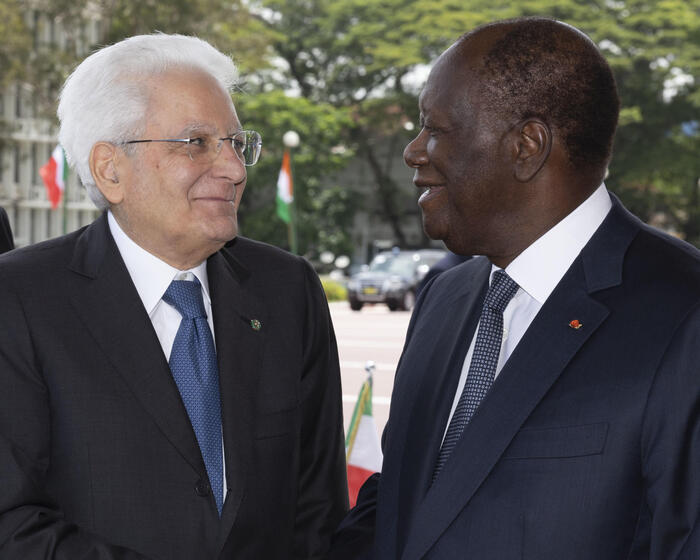Icon: enlarge
Geriatric nurse, resident in nursing home
Photo: Tom Weller / dpa
The geriatric care industry is starting a groundbreaking week: will there be a nationwide collective agreement that is binding for all in the future - or will it remain very low wages and further claims for many geriatric care workers?
The industry is large: According to the Federal Statistical Office, around 1.2 million employees worked in the companies in 2019, 420,000 of them in outpatient services and almost 800,000 in nursing homes.
A few weeks ago, the Ver.di union and the BVAP employers' association concluded a collective agreement that, among other things, provides for wage increases of up to 25 percent by 2023.
Federal Labor Minister Hubertus Heil (SPD) wants to make this collective agreement generally binding.
Then it would apply to the entire industry, including companies that belong to a competing employer association.
Two of them - AGVP and BPA - are significantly larger than BVAP, whose members have around 70,000 employees;
So far, however, they have not concluded collective wage agreements with unions.
The AGVP now wants to have the collective agreement between Ver.di and BVAP declared invalid in court.
Before Heil can make the collective agreement generally binding, the law also requires the charitable organizations of the churches - Caritas and Diakonie - to agree.
Caritas wants to decide on this on Thursday, Diakonie on Friday.
Rüdiger Becker and Hans-Peter Daub represent two institutions of the Diakonie, both have been fighting for a generally binding collective agreement for the elderly care industry for years.
Becker is chairman of the board of the Lower Saxony Diaconal Employers' Association (DDN) with around 40,000 employees in the care, health and social sectors, which is a member of the BVAP.
Daub is the board member of the Diakonie umbrella foundation with around 3500 employees in Lower Saxony and Saxony-Anhalt.
SPIEGEL:
Mr. Becker, Mr. Daub, you yourself employ thousands of elderly care workers and are campaigning within the Diakonie for approval of the generally binding collective agreement.
How confident are you a few days before the decision?
Becker:
We are very concerned.
A two-thirds majority is required in the Diakonie's labor law commission for approval.
But it currently looks critical.
There could even be a very clear vote against this collective agreement.
Daub:
If it came to that, it would be a terrific self-contradiction.
As a social welfare organization, we have not been able to demand for many years that this industry is regulated by collective bargaining agreements, that wages and working conditions become better across the board - and that we ourselves oppose it now that there is finally a realistic chance of this.
SPIEGEL:
You sound disappointed, but also surprised.
Becker:
That's right.
In this overall complex and difficult process, we went towards a nationwide tariff with the expectation that this approval would not be the hurdle at which it could fail.
In the political debate, the churches have long been in favor of collective agreements in care.
And both at Caritas and ours, the nursing staff are already properly paid anyway, so there would not even be an indirect cost problem.
SPIEGEL:
There is a threat of rejection not only in diakonia.
The spokesman for the employers' side in the Caritas Commission also expressed himself very skeptically in the "Frankfurter Allgemeine Zeitung".
If it is not the content of the collective agreement itself, what is it?
To person
Photo:
Diakonie umbrella foundation
Hans-Peter Daub
, 61, is a pastor and since 2014 board member of the Dachstiftung Diakonie, which employs around 3,500 people in Lower Saxony and Saxony-Anhalt.
Daub is a board member of the Lower Saxony Diaconal Employers Association (DDN) and the Association of Diaconal Employers in Germany (VdDD).
Daub:
The main reason is obviously the concern about the labor law special rights of the churches.
Unlike in the private sector with trade unions, employers' associations and collective agreements, there is the so-called third way, in which so-called employment contract guidelines are defined in joint commissions of employers and employees ...
SPIEGEL:
... and where the employees have no right to strike.
Curiously, a generally binding collective agreement would also not apply to church institutions.
Daub:
The fear is more fundamental and long-term, in the sense that such a collective agreement would one day in fact become the key currency of the industry and thus indirectly endanger the special right of the churches to regulate their internal affairs.
SPIEGEL:
What would the consequence be if Caritas and Diakonie actually refused to give their consent?
Daub:
Then a great opportunity would be easily wasted.
In the few months leading up to the election, no other regulation will come through the Bundestag, and it remains to be seen how the majority will be afterwards.
So nothing in the current situation would change in the foreseeable future: Diakonie and Caritas will continue to offer reasonable wages and working conditions, as do most municipal and, by the way, some private care providers - the boundaries are not so clear in this fragmented industry.
But with many other private providers, often small care services, people are simply poorly paid and poorly protected under labor law.
Icon: enlarge
Geriatric nurses, people in need of care in Heidelberg: Will a nationwide collective agreement be for everyone?
Photo:
Ute Grabowsky / imago images / photothek
SPIEGEL:
However, there is already a minimum wage in care for the elderly that is higher than the generally applicable one.
Becker:
Do you know how long nursing assistants have to work at the minimum wage in order to have a pension above the basic security level in old age - i.e. 832 euros per month, specifically?
On January 1, 2022, the minimum wage for them is twelve euros, then they would have to work full-time for 51 years.
The care minimum wage commission has just not achieved the goal of ensuring adequate earnings in ten years.
People end up in poverty in old age, although they have worked hard all their lives.
SPIEGEL:
And with a collective agreement?
Becker:
Then the nursing assistant would get 13.80 euros, and it would still be 44 years until the pension above the basic security.
This is basically still shameful, but it can be improved in wage disputes.
Unfortunately, some in the labor law commissions of Diakonie and Caritas argue that collective bargaining policy is not a social policy.
We are convinced of the opposite.
Because the alternative is that the people who work in our facilities for their entire life end up with us again - in the soup kitchens, with food sharing, where we volunteer to give them food parcels to take home, while some operators benefit from great returns Grow your finca on Mallorca and order your vineyard.
SPIEGEL:
There are definitely other arguments against this collective agreement.
The employers in the BVAP only employ around 70,000 of the more than one million employees in geriatric care, and of them only very few are Ver.di members.
The much larger employers' association AGVP therefore wants to have the contract declared invalid by filing an action before the labor court in Berlin-Brandenburg.
Becker:
It is true that the BVAP stands for less than ten percent of the workforce - but there is no other collective agreement in the industry that would be valid for more employees.
Because there is no other at all.
SPIEGEL:
In addition, the higher wages for the nursing staff would have to be paid by someone.
The fear is that the self-contributions of those in need of care would increase accordingly.
Becker:
The health minister had announced that he would tackle a reform of long-term care insurance in this legislature.
In short, it would look the other way around as it is now: The contribution of those in need of care would be capped, so all cost increases would be attributable to long-term care insurance, which in turn is supported by higher tax subsidies.
So this concern is unfounded.
Daub:
The argument is generally inadmissible.
We cannot keep elderly care cheap at the expense of the employees, we simply cannot pay them what they earn and in the end leave them without a pension to live on.
more on the subject
Left outraged: lawsuit encumbered plans for nationwide collective agreement in elderly care
Cashier, nurse, garbage collector: That's how much everyday Corona heroes earn by Florian Diekmann
SPIEGEL:
The accusation of the Federal Association of German Employers' Associations (BDA) is that the BVAP was formed in 2019 at the request and request of Minister of Labor Heil - in order to then deliver the collective agreement, which he can declare generally valid.
That would actually be a strange conception of collective bargaining autonomy, which Caritas and Diakonie do not necessarily have to like, right?
Becker:
It wasn't like that.
You see, there are socially responsible companies from the Arbeiterwohlfahrt (Awo), the Arbeiter-Samariter-Bund (ASB), from the Diakonie, but also from the private sector.
They are of the opinion that if we want to continue to earn money in this industry, that is only possible with people who are interested in working in geriatric care.
For this we need a collective agreement that regulates minimum wages and other minimum conditions.
And only then did the dialogue with politics begin.
Daub:
That's why a rejection by Caritas and Diakonie would be so incomprehensible.
For many years there has been an absolute consensus in the churches that collective agreements in care are urgently needed.
Now suddenly important representatives are changing fronts and fighting against a collective agreement.
Icon: The mirror














